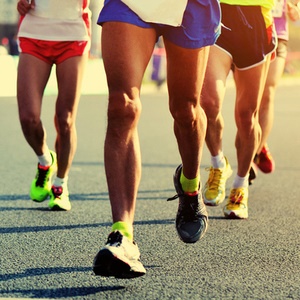
Easter Weekend in Cape Town means one thing – thousands of experienced and novice runners alike will line up to participate in the Old Mutual Two Oceans Half or Ultra Marathon.
As well as the more well-known 56km Ultra Marathon and 21.1km Half Marathon, the race weekend now also includes a series of trail runs and a fun run for those not ready for longer distances.
Whichever race you’re doing, it’s important to nail your nutrition strategy. Food is the source of energy that you will need to get you across the finish line.
Why nutrition is so important
According to a previous Health24 article, carbohydrates such as rolled oats, wholegrain bread, fruit, vegetables and legumes are the body’s primary source of energy. The body stores these carbohydrates in a form called glycogen, which is found mostly in our muscles, but also in the liver.
This means our bodies have enough energy stores to last us for around 90 minutes of exercise. The body can convert carbohydrates (when needed) into fat and protein for energy, but this is a less efficient process than simply using carbohydrates.
Failing to adequately fuel for a race will lead to glycogen depletion and this will cause several problems, from fatigue to cramping, dizziness and weakness.
But don’t overdo it!
The opposite, eating too much before a race, can cause sluggishness and digestive problems such as bloating, stomach cramps and diarrhoea.
You can avoid any potential problems by following this sound advice on how to optimise your nutritional strategy in the lead up to the race, on the day, and in the aftermath.
Pre-race
Nutrition requirements differ from person to person, especially when it comes to exercise. Some people can seemingly eat whatever they like and can power themselves on junk food. Others can find themselves desperately queuing for the nearest portaloo if they so much as smell something spicy the day before a race.
It’s therefore important to use the time leading up to the race to figure out what works for you. Your training runs, for instance, are the best time to figure out whether your best form of fuel would be energy gel, an energy bar, gums or sports drinks.
This is also a good time to assess your general diet and clean up where necessary. If junk food leaves you feeling sluggish, it’s time to cut down on greasy foods loaded with sodium and eat a more balanced diet, consisting of wholegrains, lean proteins, fruit and vegetables.
If your alcohol intake interferes with your training, it’s time to swap the tipple for something non-alcoholic the night before your training runs to ensure that you feel rested and energised during your workouts. Your muscles will also be able to recover more quickly afterwards and you will not become as dehydrated.
Smoothies are convenient to get your nutrients on the go through a variety of fruits and green veggies. Don't add too many sugary ingredients such as sweetened yoghurt, ice cream, or sugar.
On race day
Race day is the time to stick to what you are familiar with. Ensure you have a solid breakfast more than an hour before the start.
An ideal pre-workout meal is high in carbohydrates, moderate in protein and low in fat – the latter two are harder to digest, and can cause digestive issues. Choose the things that worked the best for you during your training, whether it’s a slice of toast with peanut butter or oatmeal topped with nuts and banana slices.
Given that you’ll probably be waiting at the start for a long time, it might not be the worst idea to prepare your breakfast the night before.
Pack the gels, gums and bars you will need on race day the night before.
If you’ve got a favourite fuel such as energy gels, sports drink or bars, you need a running pouch or hydration belt to carry it in. As a bonus, you won’t need to use the plastic sachets given out at the water tables, contributing to the overall cleanliness of the race.
Finally, while it’s usually best to play it safe on race day, you should be flexible and listen to your body. If, for instance, you find yourself craving the salty potatoes being handed out by spectators, go ahead and grab one.
Post-race
In the immediate aftermath of the race, eat whatever you like. You’ve earned it and your body needs to replenish calories; it’s not really concerned what shape they come in.
In days that follow, you can look at things like recovery drinks, protein bars and salads loaded with wholegrains like quinoa or brown rice, combined with lean protein such as chicken or fish to help aid muscle recovery. Get your post-race nutrition right and you’ll be back up and running much sooner than you’d expect.
Finally, a few days after the race is done, take a little time to figure out what worked before, during, and after the race and what could be improved. Focus on resting, recovering and thinking about a strategy for your next race.
Image credit: iStock




 Publications
Publications
 Partners
Partners














